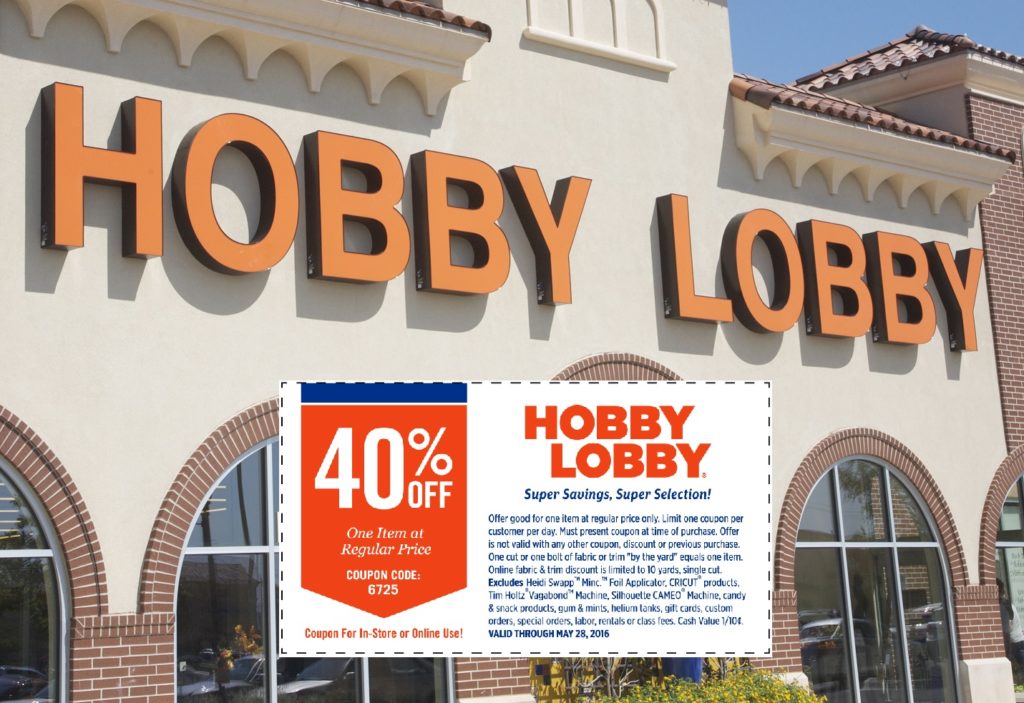Be careful the next time you use a coupon and don’t pay close attention to the fine print. A retailer says that the very act of using a coupon means you agree to its terms, so if you have any objections after the fact – too bad.
That warning comes from craft store chain Hobby Lobby, as it defends itself against multiple legal challenges to its pricing and couponing practices.
Just before the holidays, two plaintiffs agreed to dismiss their claims against Hobby Lobby, as first described in a lawsuit filed in Alabama in May of 2016. But since that time, two other plaintiffs joined the proposed class-action case, and a shopper in California filed a separate lawsuit citing similar claims.
So for Hobby Lobby, it’s one step forward and one step back.
At issue are Hobby Lobby’s “always discounted” items, and its coupons that can only be used on “regular priced” items. In their original lawsuit filed a year and a half ago, Alabama residents Diane Browning and David Phillips argued that their coupons should have given them a discount off the selling prices of the items they purchased, and not the “artificially inflated” so-called “regular prices”.
Each of them purchased items that were marked as being “always 30% off”, and each used a coupon offering 40% off “one item at regular price”. Since their items were “always” 30% off, the plaintiffs argued that the selling prices were the de facto “regular prices”. But Hobby Lobby only gave them an additional 10% off the “always 30% off” price, and not a full 40% off the price at which the item was “always” sold.
Illinois resident Mary Carrara and Georgia resident Wendy Calma later joined the case, citing similar experiences when purchasing products using a Hobby Lobby coupon with items that were “always” on sale.
The plaintiffs called the whole thing a “false and deceptive scheme” that Hobby Lobby uses for the purpose of “attracting customers to its stores with the promise of discounts that did not ever exist”. Hobby Lobby’s “regular” prices are “an artificially inflated price at which the merchandise has never been sold by Hobby Lobby,” the lawsuit went on. “Rather, it is a fiction created by Hobby Lobby.”
Hobby Lobby has blasted back with a spirited defense of its discounting practices, in a motion to dismiss the remaining claims. The plaintiffs’ claims “are based on nothing more than (their) own misinterpretation of the coupon’s terms, an interpretation that ignores the key stated limitation on coupon usage,” it argues. Each plaintiff “received the full 40% discount allowed by the coupon they used. Each received 40% off of the regular (not discounted) price of the items they purchased.” Although the term “regular price” is “not expressly defined,” Hobby Lobby acknowledged, “it is plain that a ‘regular price’ cannot logically be a ‘discounted price’… All of these statements made it emphatically clear to all who opened their eyes that the 30% off prices were discounts.”
In summary, the plaintiffs have no case because they bought the items, raised no objection after receiving their receipts, took their items home, used them and made no effort to return them – all of which “demonstrates assent to the coupon offer on Hobby Lobby’s terms,” the retailer declares.
The question is whether the plaintiffs fully appreciated the ramifications of Hobby Lobby’s “always discounted” prices. In a separate lawsuit filed in May of 2017, California resident Christina Chase argued that Hobby Lobby simply makes up its “regular prices”, so its “always discounted” prices don’t represent a real discount at all. “The result is a sham price disparity that misleads consumers into believing they are receiving a good deal,” her lawsuit reads. Since shoppers are attracted by the prospect of saving money, retailers like Hobby Lobby “have an incentive to lie to customers and advertise false sales,” the lawsuit goes on.
In its response to the Alabama lawsuit, Hobby Lobby acknowledged that the marked price of an “always discounted” item is “generally not a previous price that Hobby Lobby actually charged, but was instead a comparable price that other sellers charged for similar products.”
That explanation wasn’t good enough for New York’s Attorney General, who announced a settlement with Hobby Lobby over its pricing practices in 2014. “Permanent sales” constituted false advertising, he determined: “When companies mislead customers by advertising never-ending sales, our office will hold them accountable.” In addition to paying penalties and making charitable donations as penance, Hobby Lobby agreed to change its advertising practices.
But the current plaintiffs say Hobby Lobby didn’t learn its lesson. Because of the New York settlement, “Hobby Lobby cannot claim that it does not know that advertising ‘permanent’ or ‘never ending’ sales is not misleading,” they argue.
Phillips and Calma, who agreed to drop their case, did not explain why they did so. If there was a financial settlement involved, neither side is discussing the terms.
In the meantime, Hobby Lobby is still defending itself from three other plaintiffs’ claims. And with thousands, or millions, of other Hobby Lobby shoppers potentially also affected by the store’s couponing and discounting practices, it could be up to a court to determine whether Hobby Lobby’s coupons are to be defined “on Hobby Lobby’s terms” – or the court’s.
Image source: Hobby Lobby














